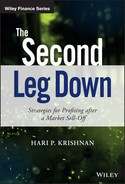Preface
There have been times when I have looked into the abyss as a portfolio manager, yet found a way to avoid disastrous losses. My trading accounts have weathered the 2008 crisis, the 2010 Flash Crash, the European Crisis of 2011 and the volatility spike from nowhere in August 2015, with varying degrees of success. Things have not always gone as well as I had hoped, yet I have always come away with a collection of new tactics for survival. For a fund manager, it is about survival after all. Aside from the money, your reward for decent performance is another year of money management. You don't want to take the path of boxers, who only decide to retire after a series of devastating knockouts. It is nice not to have to go out on your shield. This book has been inspired by the various crises I have faced as a money manager and the techniques I have learned and devised for managing through them. As every crisis is somewhat different, finding the most efficient hedge is a never-ending quest. I do hope that readers will find something that they can use to avert catastrophic losses.
The style of this book is casual and conversational, yet it attempts to be as accurate and realistic as possible. I have been asked who the ideal reader of this book might be. The best answer I can give is me, 20 years ago. This is a more pedestrian effort than Rilke's Letters to a Young Poet. Still, if I had followed the roadmap laid out in the pages that follow, I would have avoided numerous mistakes over the course of my career. More pragmatically, the book is targeted at a wide range of potential readers. Pension fund managers might find value in the discussion of duration hedging, bespoke trend following and roll down as a source of return for bond portfolios. The introductory options sections are designed to give a buy-side perspective on a topic that is usually discussed in terms of arbitrage, precise replication and stochastic calculus. I try to address why someone might want to use particular options structures. I also highlight specific structures that portfolio managers actually use and what might predicate a certain trade.
It is common for portfolio managers to hide their best ideas. In some cases, they might even publish strategies that didn't quite work, for implementation reasons. This leads to a situation where people who don't have any money management experience write extensive books about investing, while those who have the most to contribute are relatively silent. How is it possible to provide some valuable content without giving too much away? In this book, I have tried to veer from the norm. By focusing on hedging, rather than alpha generation, I have been able to go into some detail about specific strategies, without pretending to offer a cook book for making money. These have actually been battle-tested in the markets, for institutional clients.
